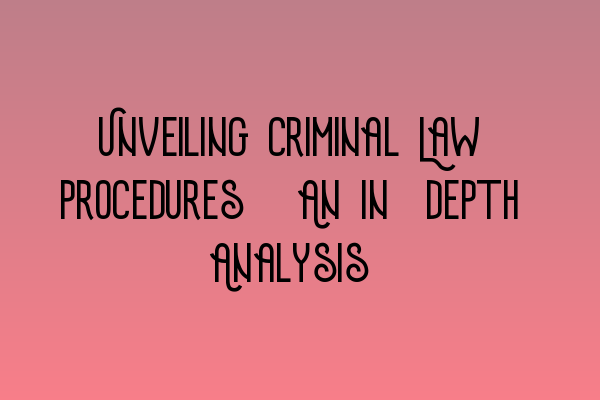Unveiling Criminal Law Procedures: An In-depth Analysis
At SQE Criminal Law & Practice Law UK, we understand that navigating the intricate world of criminal law can be a daunting task. That’s why we’re here to provide you with a comprehensive analysis of criminal law procedures, shedding light on the complexities within the system.
The Importance of Understanding Criminal Law Procedures
Before we delve into the nitty-gritty details, it’s crucial to highlight the significance of understanding criminal law procedures. Familiarizing yourself with these procedures can greatly impact your ability to navigate the legal system, whether you’re a law student, legal professional, or an individual seeking justice.
Let’s start by examining the various stages of criminal proceedings:
1. Arrest and Investigation
The first stage in criminal proceedings involves the arrest and investigation process. This stage entails the gathering of evidence, questioning of suspects, and any necessary searches. It sets the groundwork for the subsequent stages and lays the foundation for a fair trial.
To learn more about the intricacies of arrests and investigations, check out our SQE 1 Practice Mocks FLK1 FLK2 article.
2. Charging
Once the investigation is complete, the prosecuting authorities decide whether to press charges against the accused. This stage involves reviewing the evidence gathered during the investigation and determining whether it is sufficient to initiate legal proceedings.
3. Bail Hearing
In some cases, the accused may be granted bail while awaiting trial. A bail hearing takes place to assess the risk of the accused absconding, interfering with witnesses, or committing further offenses. Understanding the factors considered during a bail hearing is crucial in effectively representing your client’s interests.
To gain a deeper understanding of bail hearings, we recommend exploring our SQE 2 Preparation Courses.
4. Pleading and Case Management
Pleading and case management is a critical stage in criminal law proceedings. It involves the accused entering a plea of guilty or not guilty, followed by case management discussions to streamline the trial process. Adequate preparation during this stage is essential to present a strong defense or prosecution.
5. Trial
The trial is the focal point of criminal proceedings, where evidence is presented, witnesses are examined and cross-examined, and legal arguments are made. Understanding trial procedures, rules of evidence, and the burden of proof is vital to ensuring a fair trial and achieving justice.
For SQE 1 Practice Exam Questions to test your knowledge of trial procedures, refer to our SQE 1 Practice Exam Questions article.
6. Sentencing
Upon conviction, the court proceeds to the sentencing stage, where the appropriate punishment for the offense is determined. Sentencing considerations may vary depending on the nature and severity of the crime, as well as any relevant mitigating or aggravating factors.
Stay Informed and Prepared with SQE Criminal Law & Practice Law UK
As a leading provider of legal education and resources, SQE Criminal Law & Practice Law UK aims to empower individuals with comprehensive knowledge of criminal law procedures. Our SRA SQE Exam Dates article provides valuable information on upcoming exam dates, ensuring that you stay ahead in your legal journey.
For a more in-depth understanding of criminal law procedures, browse our SQE 1 Preparation Courses. Our expert tutors are dedicated to equipping you with the necessary skills and knowledge to succeed.
By immersing yourself in the intricacies of criminal law procedures, you gain a competitive edge in your legal career and empower yourself to make informed decisions in pursuing justice.
Don’t hesitate—start unraveling the complexities of criminal law procedures today!
